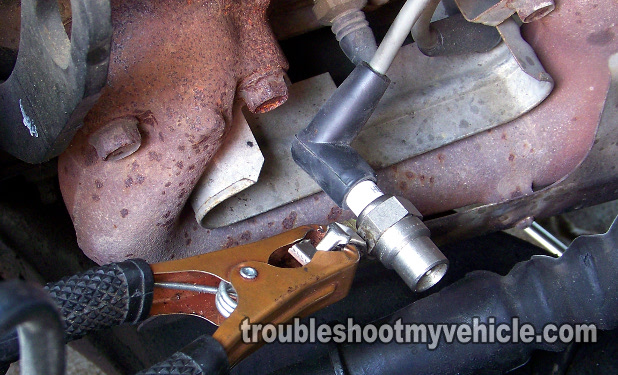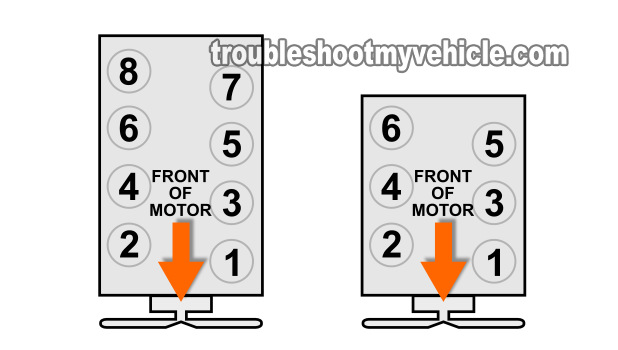
This article will help you to understand some of the most common causes of misfires and misfire codes (P0300, P0301, P0302, P0303, P0304, P0305, P0306, P0307, P0308) on the GM 4.3L, 5.0L and 5.7L equipped pick ups and SUVs.
I'm also gonna' offer you a simple diagnostic strategy (one I've used with a lot of success) and guide you to the test articles you'll need to get to the bottom of your misfire or rough idle issue.
Contents of this tutorial:
What Is A Misfire Condition?

A misfire condition, in non technical terms simply describes an engine that is not running on all cylinders.
This condition is also best described by other common terms: 'engine has a dead cylinder' or 'engine has a miss' or 'engine has a rough idle'.
Whether your GM vehicle has a V6 or a V8, if one cylinder or two cut out, it won't run on 100% engine power and this will cause some of the following consequences (symptoms):
- The check engine light (CEL) will be on.
- One or more misfire codes (P0300-P0308) will be stored in your pickup's PCM memory.
- P0300 Random Cylinder Misfire.
- P0301 Cylinder #1 Misfire.
- P0302 Cylinder #2 Misfire.
- P0303 Cylinder #3 Misfire.
- P0304 Cylinder #4 Misfire.
- P0305 Cylinder #5 Misfire.
- P0306 Cylinder #6 Misfire.
- P0307 Cylinder #7 Misfire.
- P0308 Cylinder #8 Misfire.
- Sometimes, even tho' the engine is suffering a bonafide misfire, no misfire codes are registered in the computer's memory and/or no check engine light (CEL) on.
- Lack of power upon acceleration.
- Smell of unburned gas exiting the tail pipe.
- Rough idle and may stall.
- Cranks but does not start.
- Will not pass the emissions tests.
- Bad gas mileage.
What complicates things a little further, is that your specific vehicle may come equipped with a TBI (Throttle Body Injection) or a CPI (Central Port Injection) or a CSFI (Central Sequential Fuel Injection) fuel system but in reality, all of the misfires, irrespective of the type of fuel or ignition system, have common root causes.
What Causes A Misfire Condition?
Since quite a few things can cause and engine to misfire, we need to understand the basics of what each engine cylinder needs to create power. Now, don't worry, I won't go into minute technical detail, just the basics (and in plain English) that you need to troubleshoot your misfire issue.
The most important thing you need to know is that each cylinder needs air, fuel, and spark to produce power. So, let's take a look at how each one is delivered to the engine:
Ignition System: The ignition system is responsible for the production and delivery of spark. The ignition system is usually the culprit behind a misfire.
The usual suspects (that cause a misfire, rough engine idle, engine miss, 'dead' cylinder, etc.) are:
- Bad spark plugs.
- Bad spark plug wires.
- Bad distributor cap.
The good news is that all of the components that make up the ignition system can be tested, and at the end of the article I'll show you where to find the 'How To' test articles.
Fuel System: The fuel system is responsible for the delivery of fuel. If fuel is missing from any one specific engine cylinder, it will misfire.
GM in all its wisdom decided to use a fuel injector assembly (affectionately referred to as the 'Spider') that sits inside the intake manifold plenum. When this bad boy starts to fail (by leaking fuel inside the plenum), it will cause a misfire condition.
Engine Mechanical Condition: The pistons and valves are the ones that draw air into the engine. Usually all cylinders wear out evenly but every now and then, either thru' lack of maintenance or some mechanical problem, you'll have one or more wear out at an accelerated pace.
To make the long story short, those cylinders (with accelerated wear and tear) to produce a less than average compression value that will cause a misfire condition.
Other issues, that can not be overlooked are vacuum leaks.
